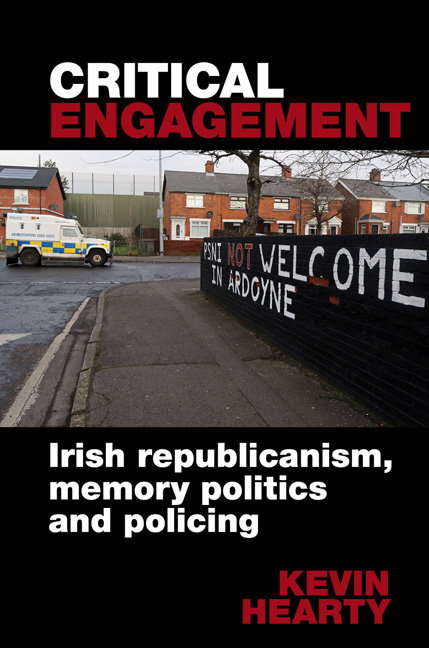Book contents
- Frontmatter
- Contents
- Acknowledgements
- List of Figures and Tables
- List of Abbreviations
- Introduction
- 1 Understanding a Fraught Historical Relationship
- 2 Irish Republican Memory as Counter-Memory
- 3 Ideology and Policing
- 4 The Patriot Dead
- 5 Transition, ‘Never Again’ and ‘Moving On’
- 6 The PSNI and ‘Community Policing’
- 7 The PSNI and ‘Political Policing’
- Conclusion
- References
- Index
Conclusion
- Frontmatter
- Contents
- Acknowledgements
- List of Figures and Tables
- List of Abbreviations
- Introduction
- 1 Understanding a Fraught Historical Relationship
- 2 Irish Republican Memory as Counter-Memory
- 3 Ideology and Policing
- 4 The Patriot Dead
- 5 Transition, ‘Never Again’ and ‘Moving On’
- 6 The PSNI and ‘Community Policing’
- 7 The PSNI and ‘Political Policing’
- Conclusion
- References
- Index
Summary
This book set out to critically examine the role of memory in the Irish republican debate on policing. In doing so, it addressed the interlocking research questions of what role memory plays in the debate and how it performs this role. The conclusions reached herein have been drawn from an in-depth case study conducted across a broad spectrum of opinion within contemporary Irish republicanism. Drawing on the interaction between autobiographical memory and collective memory, this book highlights how memory helped condition attitudes towards policing during the 2006–07 debate and that, in conjunction with lived reality since then, it continues to condition views of policing in the six counties. Interestingly, this interaction in itself illustrates how any examination of the role of memory in the Irish republican policing debate should not be restrictively confined to memory politics. It is only by looking beyond specifically political usage of memory that a fuller appreciation of its role in the debate can be attained. To this end, it must be recognised that the role of memory in the debate is not restricted to hegemonic memory politicking but is central to how individuals interpret transitional processes too. Hence, as Susanne Buckley- Zistel has argued, while memory is adaptable for competing political discourses it is also ‘highly personalised’ for those with lived experience of the violent past.
Irish republican policing memory is multifaceted. It operates in different ways on different levels for different ends. The ‘malleability of memory’ means that memory, even if remaining substantively constant for the most part, is capable of being moulded to suit whatever context it needs to function in. In terms of what role memory plays, it has been both an enhancer of and an impediment to the transitional process in Northern Ireland – particularly so if one subscribes to a ‘thick’ version of transitional justice that expands beyond the ‘thin’ legalistic notion of punishing past wrongs via the courtroom. In order fully to appreciate this point, it is instructive to reiterate how transitional justice scholars have conceptualised transition in the six counties; it represents movement from a state that was beset by political violence and human rights abuse into one characterised by consociational power sharing and other reforms that have removed the worst excesses (but not every instance) of political violence and human rights abuses.
- Type
- Chapter
- Information
- Critical EngagementIrish republicanism, memory politics and policing, pp. 249 - 262Publisher: Liverpool University PressPrint publication year: 2017



